
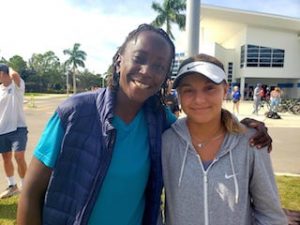

Today, we are taking a slightly different approach and have interviewed three female coaches. All three have different backgrounds and it has been interesting to find out their thoughts on being a female coach. We have Rosemary Owino who is based in Kenya, Debbie Ladig who is based in Texas, USA and Andrea Martinez who is based in Italy, but from Columbia. We will refer to them as RO, DL, and AM for the purpose of this article.
Good morning Rosemary, Debbie and Andrea, thank you for taking some time out of your day to answer these questions. Firstly, please introduce yourself and your background in tennis?
RO: My name is Rosemary Owino, currently the acting Technical Director for Tennis Kenya and the Davis Cup/ Fed Cup captain for Team Kenya as well as an ITF Touring team coach. I have worked for the ITF at the previous high performance centre in Pretoria as well as the University of Pretoria’s high performance centre previously as assistant coach both times. Currently an ITF level III coach and I also hold an Honours Degree in Human movement and Sports Science from the University of Pretoria. I have been a tennis coach for 10+ years, 18 years to be exact, learning about the sport and using it to grow as well as grow others as much as I can.
DL: My name is Debbie Ladig, and have been a teaching pro in Houston, Texas since 1978…
My teaching experience includes teaching in New Mexico, California, New Hampshire, North and South Carolina, and Michigan. Some of that experience was at Tennis Resorts linked to Rod Laver and Roy Emerson, as well as Racket Clubs, Country Clubs, and even being an independent pro for years.
Playing experience includes, playing on a full tennis scholarship, rankings in Texas, as well as USTA nationals. One year of Team Tennis for Germany, and played WTA tournaments for 8 years with a singles high of 429.
AM: Hi, I’m Andrea Rodriguez Martinez, tennis teacher in Rome Italy. I’m a Tennis Instructor for the Italian Federation, (paddle and beach tennis). I had my best ranking reaching 1st Under 14 in Colombia. Qualified in some draws for South American juniors tournaments. I spent a year of essential and great training at the Nick Bollettieri Tennis Academy in Florida, where I lived as a student of the Academy and was part of the assistant coaching staff.
There, I learned from the training methods for the talented tennis players and I developed friendships. In Italy I have worked in two Clubs: Sant’Agnese for 19 years and Parioli (current).Some of my responsibilities are to manage one of the mini-tennis inter-club competitions, program manager for the Annual Tennis School, and organizer/instructor of the Summer Camp Program for children and young adults.
I also serve as athletic trainer of the Tennis School Recreational Sector and I chaperone young players on their training trips to the Bollettieri Tennis Academy in Florida. . I love teaching tennis and enjoy seeing people have fun while developing and improving their tennis skills. In 2017 I created a little activity “Tennis in Rome”, a service that allows the tourists from all over the world to Play Tennis In the Eternal City. This idea has grown up and together with other coaches we have had nice ‘Tennis Time’ with all our kind students.
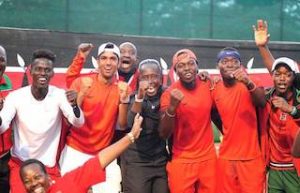
Thank you very much! How did you first get into teaching tennis, was it something you also wanted to do?
RO: As soon as I could play tennis, I realised I was going to be a coach, this was due to the fact that there was a big gap of information and knowledge to be filled. I wanted to play at a higher level but had no idea on how to do that as well as not knowing what I needed to do to get from one point to another. There was also the issue of not having any money at all to spend on playing and training, leave alone travel.
My struggles as a late bloomer (having only been introduced to the sport at the age of 18, my last year of high school) meant I had to learn a lot in a short time and the question that always struck me was “How did I not know about this lovely sport all my 18 years in life?” Immediately, I knew I needed to have these answers for the next generation of players in my region.
DL: Getting into teaching tennis happened when I was 15 years old and blew my ACL out, and was out for year. At that time, I started giving some of the local club women and younger juniors advice on their games, which turned into a lot of lessons.
AM: Having been born into the “tennis world,” I started my tennis career early. I started my profession as a tennis teacher with my father’s school. At age 21, I moved to Italy and have been teaching since then. It’s been something that I knew how to do, maybe at that time I didn’t think on doing it for so many years, .. but here I’am, I like it and I got better at doing it.
After a year of college, I met Roy Emerson, who hired me to work the Laver-Emerson Tennis resorts, with he and Rod (Laver). After working with them for 3 years, it was then, that I actually had a career, and could basically get a teaching job anywhere. It was never a plan, it was just a natural transition.
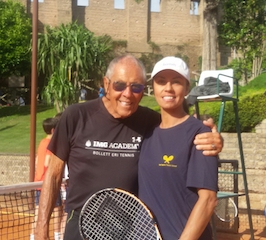
What are the difficulties you come across in your daily coaching business? Would you say these are mainly related to you being female?
RO: The main thing I have had to deal with over the years is trying to convince people of the fact that I am capable of much more than anticipated. I have had to prove myself over and over, hehehehehe, and I imagine I shall still have to keep doing this, which is not really a problem, so I guess I actually enjoy every minute of it.
This is however, not only a female problem, it is a problem that would be slightly less for male coaches but I am sure they experience it one way or another too. Having to prove ones ability at any new job is a challenge that men as well as women both experience, just that most times than not, in the culture of sport, women have to go over and beyond to prove their ability, especially when it comes to coaching male teams or male players.
DL: Daily difficulties….being in the teaching profession has always been male dominated, and being in a club situation with several other male pros, it’s always been a struggle to get lessons. Women mostly want to take from the men, unless they’re beginners, and are intimidated by the male pros. Most men don’t want to take from a female, unless they’re beginners too. Top juniors usually don’t want to take from a female, unless they started at a young age, and have kept her as a coach. That leaves the little kids, that the male pros don’t want to deal with.
AM: ..well, as known, ours is a “wearing” job, not for being on court all your life. Tennis has evolved and now there are more ways to be a good, qualified and prepared tennis coach. Reaching and training at any tennis level becomes a great challenge on a daily basis.
Yes, I would say these are mainly related to the fact of being female. I mean, seems that Tennis world consider that female are not enough good to manage with all this mansions. People do not trust women to coach them over men.
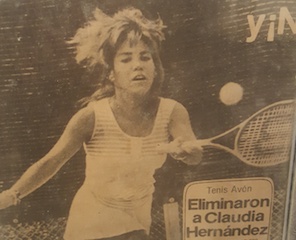
How do you overcome these difficulties?
RO: I overcome this, first and foremost by not looking at it as a difficulty, but rather as a huddle, one that I would encounter in any setting, business or otherwise. Putting my head down and focusing on making things happen and problem solving and finding ways to improve and prove that I can do the job, just as good as any other coach, male or female. I also spend a lot of my days reading, learning, educating myself, learning about the players beyond tennis, attending conferences and courses at large, not only on tennis, but on other sports too. Anything to give me an advantage to do my job better. Having a lot of conversations with people, listening and discussing different topics.
DL: As far as overcoming some of these difficulties, I’ve always tried to be several steps ahead of the other guys. I always maintained a ranking, stayed in shape, have been active in the USTA, and USPTA conventions, and kept up with the latest in teaching, which gave me the edge when some of my male counterparts weren’t up to date on things.
It also helps that I could come up with innovative programs, and tournaments, which sets me apart from the other guys.
AM: To overcome these difficulties, I just try to be myself on the court. I try to use sensibility, empathy, serenity and tenacity. I think that women are able to communicate better than men those aspects of personality at the service of a good teaching.
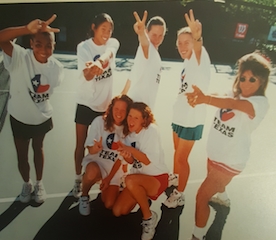
In your opinion, do you think female coaches are respected enough by male coaches in your area?
RO: I have had all but the most supportive team of male coaches working with me over the years. I have had male mentors as well as bosses and team mates over the years. This is an area in my career that I must say have been very lucky, and my situation has probably been totally different from that of most other female coaches. So yes, In my area, I feel like the male coaches do have great respect and support for female coaches. They have taken time to encourage the female community and supported them even in leadership positions.
DL: I dont think female pros are really respected in my area, as very few females are going into teaching as a career, and when they do, they don’t last very long.
I’ve been very lucky, as I’ve always had full respect, from my bosses who have always been very supportive and encouraging. It also helps that I’ve had such longevity and success as a teaching pro in Texas.
AM: Definitely. Of course it is a pity, but there should be gender equity, and evidently there is not.
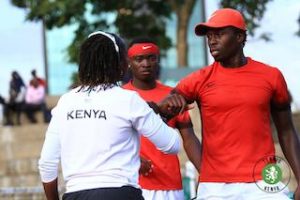
Finally, do you see changes beginning to happen within the industry to help female coaches? Where do you think we will be with this situation in 10 years time?
RO: I think both the ITF as well as most local African Federations have and are trying to create a better working environment for the female coaches and including them a lot more on development at well as management positions. If possible, with women taking up more coaching positions, I see there being a more female friendly environment in general for female coaches as well as more girls taking part in sport as a result. More considerations are being made in terms of working hours as well as seasons being more friendly for the female coaches and officials to allow for accommodation of family responsibilities.
DL: How do I think the situation will be in 10 years? I imagine it will be the same, if not worse, especially with the new ITF ruling, cutting back tournaments, and rankings. This will put a lot of coaches, both male and female out of a job.
AM: I do see changes beginning to happen within the industry to help female coaches, I see them out of Italy and so hopefully it will happen all over the world.
I think in 10 years female coaches will have more decision-making capacity, will occupy more important positions in the various entities and will be able to create events, manage clubs and academies, speak at more conferences, lead businesses and contribute to a whole series of ideas inside this huge world of Tennis. I certainly hope so, and I believe it is going in the right direction.
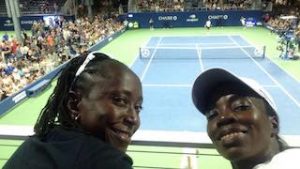

Thank you ladies for taking the time to give your views of being a tennis coach. We hope that you find this interesting and really do hope that female coaches are on the rise. There are obviously issues surrounding being a female tennis coach, and hope that these issues can be resolved for the good of the game. Lets hope that more and more coaches can give their views and continue helping this amazing industry.
We are always looking for new coaches and players to interview. If you have something you would like to say to the tennis world, please feel free to get in touch by emailing on mark@sportsprosconnect.com or send us a Whatsapp on +353867922188.
Mark Wylam (Owner Sportsprosconnect.com)
